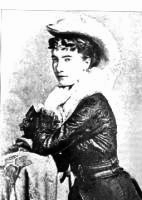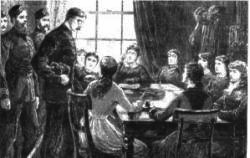
Fanny Parnell
Anna Parnell (1852-1911), sister of Charles Stewart Parnell, was one of the founders of the Ladies' Land League.
| Anna and her sister Fanny had lived in Paris and the USA where they gained experience of running organisations, fund raising and gaining publicity. Fanny Parnell (1849-1882) founded the American Ladies' Land League to raise funds for famine victims in Ireland; she was a poet and her poem Hold the harvest was described as the Marseillaise of the Irish tenants. When it seemed that the Land League men were likely to be arrested, she recommended a women's league in Ireland to take over the work in their absence. |  Fanny Parnell |
Michael Davitt agreed and proposed a Ladies' Land League for Ireland. His colleagues, including C.S. Parnell, were doubtful and felt that such a women's organisation would hold the men up to ridicule. Public opinion at the time was against women in politics but Davitt was positive, 'No better allies than women could be found for such a task. They are, in certain emergencies, more dangerous to despotism than men.' In the event, Anna Parnell, aged 28, returned to Ireland from the USA in 1880 to help lead the Ladies' Land League.
When Parnell and other leaders were imprisoned in 1881, as predicted, the Ladies' Land League took over their work. Offices were provided in O'Connell St. but very little help or detailed instructions were given. However, the women held public meetings and encouraged country women and men to be active in withholding rent, resisting evictions and boycotting. They raised funds for the League and for the support of prisoners and their families. They distributed Land League wooden huts to shelter evicted tenant families, and by the beginning of 1882 they had five hundred branches, thousands of women members and considerable publicity.
Their meetings were frequently broken up by police and thirteen members were imprisoned - not as political prisoners like the men but as criminals. They were highly controversial because many people disagreed with the way they implemented their policies while others disapproved of women activists.

Police raid on Ladies' Land League meeting
Archbishop McCabe of Dublin blamed the male leaders and asked his priests,
| ...not to tolerate in your societies the woman who so far disavows her birthright of modesty as to parade herself before the public gaze in a character so unworthy of a Child of Mary. Quoted in Maria Luddy, Women in Ireland 1800-1918, Cork, 1995, p.263. |
But Archbishop Croke of Cashel came to their defence. Several influential persons, including priests, offered their houses for meetings and protected them from the police but others kept their distance.
Anna Parnell felt that the efficiency of the Ladies' Land League was resented by the men:
| I think now that, added to their natural resentment at our having done what they asked us to do, they soon acquired a much stronger ground for their annoyance in the discovery that we were taking the Land League seriously and thought that not paying rent was intended to mean not paying it. Anna Parnell, Tale of a great sham, (ed. Dana Hearne), Dublin, 1986, p.90. |
Parnell was released from Kilmainham Jail in May 1882 and initially praised the women for their work but changed his mind soon after. The Ladies' Land League was to be brought firmly under male control and it was eventually dissolved in a humiliating manner, leaving a legacy of bitterness and resentment amongst the women. Anna Parnell wrote an angry account of her experience in Tale of a great sham, which was published in 1986, long after her death.
The Fenian John O'Leary told Maud Gonne later that while he questioned the methods of the Ladies' Land League, they were really suppressed because they were 'honester and more sincere than the men.' Andrew Kettle, staunch supporter of Charles Stewart Parnell said Anna had,
| ... a better knowledge of the lights and shades of Irish peasant life, of the real economic conditions of the country and of the social and political forces which had to work out the freedom of Ireland than any person, man or woman, I have ever met ... Anna Parnell would have worked the Land League revolution to a much better conclusion than her great brother. Quoted in Margaret Ward, Unmanageable revolutionaries, London, 1983, p.14. |
The land question was the major issue in Ireland at the time, but public and private reaction showed a deep-seated hostility to women emerging from the home into the public arena. The debate on the Ladies' Land League is still open and many questions remain to be answered but it was an important landmark as being the first time women in Ireland had formed a mainstream political organisation. That thousands of women, mostly Catholic, in the face of violent opposition, took part in activities that were anything but traditional for women, was a remarkable milestone in nineteenth century Irish women's history.